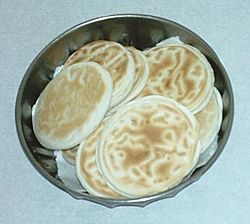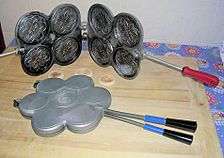Crescentina modenese facts for kids

A dish of crescentinas
|
|
| Type | Bread |
|---|---|
| Course | Entrée |
| Place of origin | Italy |
Crescentine, crescente or tigelle (sing: crescentina, crescenta or tigella) are thin, 10cm round breads from the Apennines in the Modena area of Emilia-Romagna, Northern Italy. They are made from flour, water, salt, and yeast, and traditionally eaten filled with cunza, a spread made from pork lard and flavoured with garlic and rosemary or with cold cuts, boar, rabbit, cheese, salty dressings or sweet spreads. In the Apennines Crescente have long been eaten at home or enjoyed in traditional restaurants, but in the last decade some fast food and casual restaurants have added crescente to their menus. Similar breads such as piadina, borlengo, gnocco fritto and panigaccio are made in neighbouring areas.
Originally, crescente were baked between tiles called tigelle, a term derived from a Latin word for cover. Later, the name tigella came to be used for the bread itself. Nowadays, crescente are baked in restaurants using electric griddles while at home, a special aluminium pan called a tigelliera or cottola over a gas cooker is used.
Crescentine have been identified as a Traditional Agribusiness Product by the Italian Ministry of Agriculture.
See also
 In Spanish: Crescentina para niños
In Spanish: Crescentina para niños


